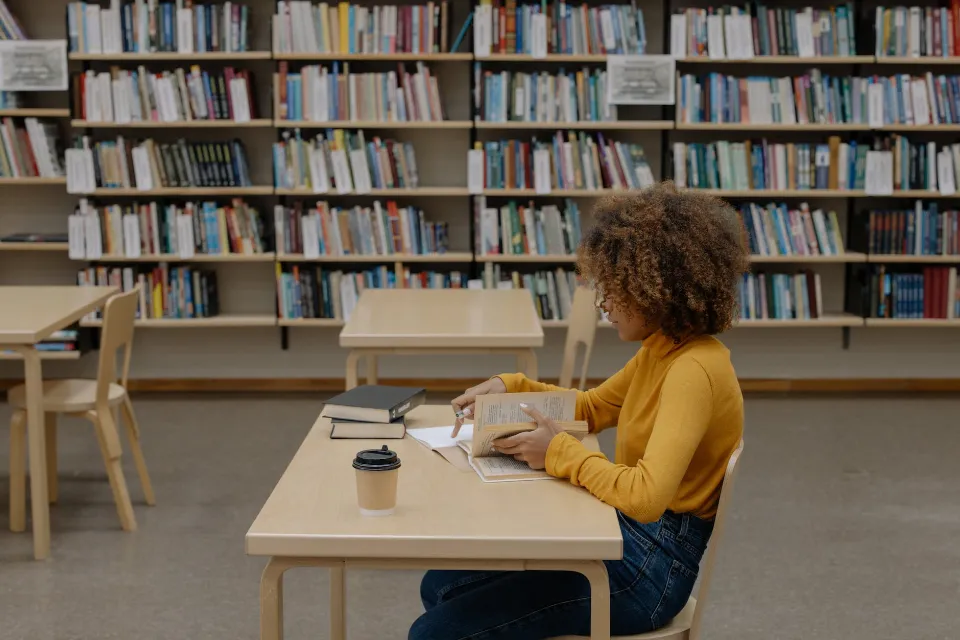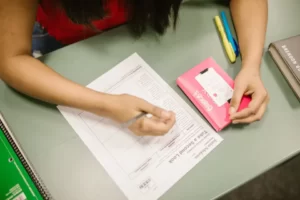
How to Transfer from Public School to Online School? Steps & Tips
Considering switching to a college or university online? This guide will aid in your school selection and ensure that your prior credits are transferred.
Transferring to a high school or college entirely online may seem complicated, but if you do your homework beforehand, it’s really quite simple. If you’re considering transferring from a conventional public high school to an online school, you might be wondering how challenging the process is and what exactly needs to be done.
The reasons why a student might want to transfer to an online high school are examined in this guide, along with crucial aspects to take into account when making a decision about a school and the typical procedures to transfer.
How to Transfer from Public School to Online School?
There are many reasons why students decide to switch to online education, including personal convictions, religious principles, and health issues. Additionally, they might be seeking more time with their families, more educational options, or a way to get away from a negative situation like bullying. Due to COVID-19, many families are also looking at online options.
According to Frontiers, research has not revealed any appreciable performance differences between online and conventional classroom students.
Traditional and online schools still differ significantly from one another, though. The location of the classes is obviously different, but there are also significant differences in scheduling flexibility, social interaction, and self-discipline demands.

When compared to traditional settings, where classes are scheduled at specific times, online schools let students work at their own pace. In order to give each student the individualized attention they need, teachers can use screen-sharing tools and videoconferencing software.
Students who are committed to their learning and have strong self-motivation skills may perform better in online programs because they set their own pace.
Parents must look for an accredited program, make a new schedule for their child, and change the environment in which the child will learn if they decide to switch to online education.
Further Reading:
- Can You Go Back to Public School After Being Homeschooled?
- Is Homeschooling More Expensive Than Public School?
- Can Homeschoolers Play Sports in Public Schools?
Tips for a Successful Transition
From setting up a dedicated workspace to learning how to “deschool,” these tips will explain how to switch from traditional public school to online school and will set both the student and parent up for success in an online setting.
Ensure Program Accreditation
Examining the program’s accreditation is essential when choosing an online university. The rigorous standards used to evaluate policies, programs, practices, and learning environments are what allow schools to be accredited, according to the accrediting body Cognia.
To maintain student outcomes, an accredited school must provide for the needs of all of its students. Additionally, only diplomas from high schools with accreditation are typically accepted by colleges. Visit the Cognia website to verify a program’s accreditation.
- Approach Online School as a Deschooling Process
For various reasons, students drop out of traditional education. The transition can be facilitated by taking a break before starting online school after leaving a traditional classroom. Deschooling is the term for this.

By reading up on the transition and organizing family meetings to set expectations, new, personalized standards can be established during this time. The involvement of students in household tasks and activities can increase. Starting with topics that pique your interest, you can gradually introduce online school subjects.
- Find an Effective Online Program
Choosing the best online program to support a student’s educational journey can vary from student to student depending on their needs and expectations. Online programs might offer features such as:
- Microlearning. Small units with short-term strategies are offered by some programs for skill-based education. Students can easily understand and master this material because it is presented in manageable chunks.
- Interactive lessons. Live quizzes that let teachers evaluate students in the moment can be incorporated into interactive lessons as can class discussions.
- learning that is both synchronous and asynchronous. Asynchronous self-learning and synchronous class participation are both used in some online programs.
- Accessible content. If a student doesn’t understand a lesson completely or was unable to attend a live lesson, a program may offer recorded lessons for them to review.
Connect With Other Students and Families for Support
The student and parent will benefit from establishing a support system. Families with students who have successfully completed online courses can offer guidance to families who are unfamiliar with the process. At both the national and state levels, there are numerous organizations that support family contact.
- Create a Schedule
Students can stay on task by making a personalized agenda and schedule. There is no requirement for identical plans when studying online because each student can proceed at their own pace. Parents must consider the student’s work habits when establishing a schedule.

In order to finish some assignments, slower-moving students might require more time. While those who work more quickly can finish their work more quickly or can learn more deeply by devoting more time to a subject.
- Designate a Study Space
Students can stay focused by designating a specific area for studying and taking tests. Distractions will be eliminated and a classroom environment will be created. Families might want to designate multiple spaces in the house as learning spaces.
They may also want to establish places or baskets where students can set aside their school materials and leave the “classroom” when they’re finished for the day.
Enjoy the Process
It need not be difficult to switch from a public school to an online program. Families can enjoy the process by coming up with creative projects and engaging learning activities. Parents can teach their children practical skills by teaching them how to cook and shop for food on a budget, for example.
The student’s productivity can be increased and new projects and activities can be facilitated by having lessons outside.
Finding An Online School Program
It’s crucial for parents to look for online curriculum options through accredited programs when choosing the best program for their child. Students who complete these programs will receive an advanced high school diploma that is accredited and accepted by colleges and employers.
Additionally, students should enroll in courses that will help them get ready for college and their future careers. Finding online programs that students enjoy will not only help them succeed but also ease the transition. These range from Advanced Placement courses to life skills classes.
When An Online High School Might Be the Better Option?
High school is a significant social turning point that many people cherish. Traditional schools, however, don’t always meet all of a student’s diverse academic and social needs. There are several types of students who might benefit more from an online education:

- Students with unique learning styles “I feel like somebody chooses online learning because the brick and mortar model has not worked well for them or it isn’t currently serving them well,” says Greenways Academy, an alternative school with its headquarters in St. Louis, was founded by Patti Greenberg. She continues by stating that some students’ learning styles simply do not work in conventional classrooms. These students might gain more from taking classes online, which provides different ways to interact with the course materials, instructors, and other students.
- Motivated learners “My personal feeling is that if a student is motivated and wants to learn and they have a facilitator to help them, they’ll be a great candidate for online learning,” says Students need to be motivated because asynchronous instruction puts them in complete control of what and when they learn because there is no set time period for accessing and completing coursework.
- Students who are advanced or who want to finish high school more quickly A typical high school day ends around three in the afternoon. On the other hand, many online high schools are open 24/7. Students can now learn more quickly and graduate earlier as a result. (Keep in mind, however, that some school districts permit traditional students to combine online courses with campus-based courses, so students are not required to select one format over the other.)

- Greenberg strongly believes that facilitators can help hold online high school students accountable for completing their work if they have the proper support systems. “A facilitator can be anyone, such as a teacher, tutor, mentor, or someone they check in with three times a week to make sure they’re progressing at a reasonable rate.”
- Teens in rural areas occasionally find that their local high school doesn’t have a lot to offer. Because of a lack of teachers, the school might not offer Advanced Placement courses or a particular subject. An online high school offers convenience for teenagers from rural areas, and it might even give them access to more resources and course options. A student might be able to find a class online through another high school if the one they are currently attending doesn’t offer the one they want or need. By eliminating the commute to and from school, online programs can also save rural families money and time.
- Students who work Some high school students must work to support their families, and the majority of the time, these hours conflict with regular class times. Students who attend high school online are able to work while still attending class.
- Participants in extracurricular activities Although the majority of students’ extracurricular activities are related to their studies, some young people become involved in non-academic pursuits like church, a community center, or a particular sport or hobby. These students can benefit from the flexible scheduling provided by many online courses.
- Students with health issues When medical issues keep getting in the way, it can be challenging for students to stay on track. In situations like this, studying online has two potential advantages: it enables students to finish assignments whenever they are able to (as long as deadlines are met), and students with compromised immune systems or severe allergies can avoid being exposed to health risks.
- Bullying victims Schools ought to be a safe environment. Unfortunately, a traditional campus isn’t for all students, which makes it challenging to focus on learning. Students can learn in a relaxing setting at online high schools.
- Students who moved Moving during the school year can be difficult for children. They must not only adjust to a new environment and make new friends, but they also switch to all new classes and teachers in the middle of the semester. The social anxiety that can accompany a major move can be lessened by finishing the school year online at their current institution.
Conclusion: Transfer from Public School to Online School
Students transfer to online schools for a variety of reasons, but flexibility is frequently one of the main drivers. In terms of timing for assignments each day, traditional high schools put you on a set schedule. Because they can be completed at your own pace and location, online high school diplomas.
Transferring from a traditional high school to an online high school is simple as long as your previous institution is accredited.
FAQs
Can I Start Online School Anytime?
Actually, it all depends on the school. Students may start their studies at any of the many start dates that online colleges frequently offer (usually between two and twelve) throughout the year. Other courses are self-paced and let students start whenever they want. Numerous online high schools also use rolling admissions and/or short terms, which enable students to enroll right away.
How is An Online School Similar to a Traditional School?
Online learning is just as important as learning in traditional settings. Exams, essays, and homework are still used to evaluate students, who continue to attend class. They’ll use textbooks and possibly form study groups with other online students, with whom they can communicate via the school’s virtual community.
Can You Start Florida Virtual School in the Middle of the Year?
Is K12 Free in Illinois?
Is K12 Free in Illinois?
What is the Age Limit for Florida Virtual School?
What is the Age Limit for Florida Virtual School?
First-graders must be 6 years old by September 1 of the school year they are enrolling in. Students must be able to complete the requirements for high school graduation before turning 20. The following requirements only apply to students in grades 9 through 12.


